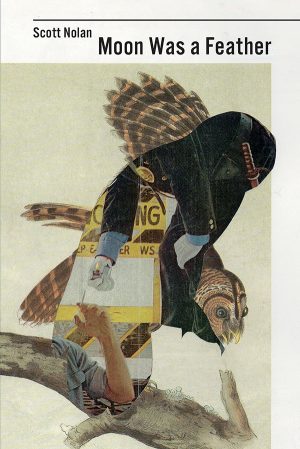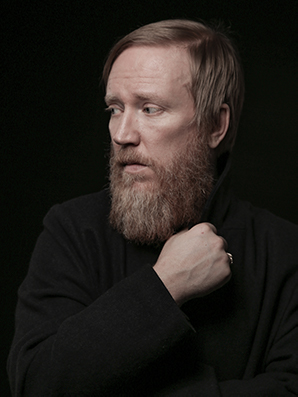Posted April 11, 2022
Transcribed and edited by Glenda MacFarlane
The Interview – Scott Nolan
Scott Nolan
Scott Nolan is a songwriter, poet, multi-instrumentalist from Winnipeg, Manitoba Treaty One territory, with nine albums to his credit. His songs have been recorded by Hayes Carll, Mary Gauthier, Watermelon Slim, and Corin Raymond, among others. Long an avid reader of poetry, Nolan was inspired to write his first collection of poems, Moon Was a Feather, when he started walking ten kilometres a day in his quest to quit smoking. Nolan discovered melodies and rhythms in the shuffling of his feet, and began writing short poems inspired by reflections on his own difficult past, as well as about people and places in his neighbourhood.
Scott, you are well known as a singer-songwriter who writes powerful lyrics, but with Moon Was a Feather, you moved into poetry. Can you tell us about how writing poetry is different from writing song lyrics?
Half a dozen years ago when I quit smoking, I started walking long distances every day. And I didn’t necessarily have a background in poetry, but the very first day I set out to do these big long walks, what wound up to be little pieces of a poem started floating around in my head as I walked. It was like a response to trauma, so to speak, as I was trying to overcome this addiction. And what’s quite different, in the obvious sense to me between the two, is that with lyrics I work on refining them, considering metre and rhyme pattern… whereas with poetry, at least in my experience, it’s almost like snapping a photo—being in the right place at the right moment — so I really try not to fool with them. I respect the poems as they arrive, whereas with the songs I refine them to fit my needs.
You’ve spent a lot of time touring throughout North America. In both your poetry and in your songs, you evoke a strong sense of place—whether that is a windy Winnipeg neighbourhood, a wheat field under the stars, or an Oklahoma sunset. Why do you choose to live in Winnipeg? What does Winnipeg give you that you can’t find anywhere else?
You know, I joke that in the early parts of my career I’d kind of defend Winnipeg during my travels, and toward the latter part of my career I found I bragged about it constantly. The thing it has for me in particular, in terms of an artists’ community, is it’s a pretty unpretentious town, quite frankly, and in all the various mediums of art there are such great people–from a Guy Maddin to a Catherine Hunter to a John Samson—that it’s hard to get too big for your britches here. We’re kind of blue-collar that way and I think it’s good for the art; I think it’s good for the artists themselves. And it’s also a strange, magical place. There are times in the worst moments of winter where it really feels like you’re on the moon. I’ve always had a theory that you can only be so big of a fish in this town. There are limits to the celebrity-type stuff, which I like. I find that unique and charming. No matter how much money or comfort or privilege you might have, mosquitoes are still a nuisance to you, you still get cold. I like that about it. It’s a bit of an equalizer in that sense.
In your musical career, you have engaged in a number of very fruitful collaborations. You’ve performed with Glen Buhr, a classically trained musician, you’ve written songs with superstars like Hayes Carll and Mary Gauthier, you’ve produced albums for artists such as William Prince, Stephen Fearing, Little Miss Higgins, and Watermelon Slim. Is poetry a more solitary pursuit? Or have you brought collaborative ideas to your poetry as well?
I’ve begun collaborating more later on, I’ve had to age into it a little bit, like my projects with Glen. Glen told me, in fact, that he’s enjoyed our little projects so much that he’s dedicated the rest of his career to collaborating. What I like particularly about collaborating with Glen is that we’ve reached the point with the material where we’re each bringing something really distinct. We’re both very needed for the result. As I get older, I feel like it’s a more joyous thing somehow, to be able to share it with somebody. It matters more somehow in a personal way.
With the songs, I’ve been very lucky. I’ve said many times that I’m a small-timer, but what’s been unique and significant about it for me has been the generosity of other more successful artists almost from the beginning in my 20s with people like Fred Eaglesmith and Hayes Carll and Gurf Morlix. People that were in much more established positions in their careers saw something in me that they decided deserved to be championed. And Hayes Carll recorded my song, “Bad Liver and a Broken Heart.” It wasn’t a hit song in that I built a big house for myself. It was a big song in that when I got down to Texas, heroes whose records I grew up with knew my name because of that song. I consider myself very lucky to have a unique angle on this business. You know, the successes have come slowly and steadily. The growth is more beneficial to you as a human and an artist if it comes at a pace where you can really appreciate it as it builds, as opposed to too much at one time or too little. I count myself lucky. At the beginning of my career when I could have gone more in the direction of showcasing and networking which is what most people in my business do, I was invited on the road with a caravan of more established artists, so it gave me the opportunity to just go dive in head-first. And I wrote songs as I travelled, which to the people around became a special thing.
And then the production stuff was another…I wish I could say that I planned any of these things, but…that happened because I stopped travelling. I’d been travelling a lot, North America, mostly, until an anxiety disorder grounded me. The pace and lifestyle connected with touring, especially on the level I’d been doing it, it just started taking its toll and I reached a place in life where I needed to hear the signals I was being sent and take my wellbeing into account. So I stopped travelling a lot and I built a little studio workshop for myself behind my house. I never really meant to produce other people’s records, but I had people coming to me with records that were really unique – really wonderful and uniquely talented people; it was all in the stars somehow, I guess. Almost every record I can think of came to me in a unique way. I’ve been lucky in a lot of ways.
Poetry has been collaborative I think, in the way that other poets have influenced me. My late cousin Patrick Nolan and later on, Patrick O’Connell, and Catherine Hunter, and Patrick Friesen. You know, I think that’s had its influences. Other mediums seem to feed into it at the moment. Music production and collage art and poetry all have certain aspects in common. Poetry is certainly the most solitary, and I seem to have the best luck with it while walking. My late cousin spent the last 20 years of his life in prison, and when I think back to our letters, we’d talk about poetry and philosophy and stuff. I was still a kid for the most part. But there was always this theme of him walking the track in the prison yard with other poets, men like Spoon Jackson, men who’d been incarcerated for very long periods of time. So I grew up as a kid with this image in my head of these two guys walking the track in the midst of this chaotic environment. And I find when I walk, there’s a rhythm. Even if I’m walking in circles, there’s a rhythm to it that feeds into it. After a few minutes of walking, you find yourself very present. Everything else seems to drift away because you’re breathing fresh air, seeing new things every moment. That’s when it seems to come to me. I’m not the best at sitting down at a desk and writing in that manner.
What is the best piece of writing advice you’ve ever been given?
Patrick O’Connell used to encourage me to write as simply and clearly as I could and I still agree with those ideas. I appreciated the concept that you didn’t need to try to hard to sound smarter than you really were. I love a lot of early blues artists and there’s something to be said about this kind of simplicity that’s almost perfect. Like a Guy Clark or a Hank Williams song. It’s either so relatable or it’s so filled with perfect imagery that you can be swept away by it every time.
Who or what do you count among your writing influences?
As a kid in my tumultuous adolescence, I got lucky. I was in a treatment facility as a young teenager and I came across a copy of The Outsiders by S.E. Hinton. I later wrote to her just to tell her how important it was to me as a young kid, especially one who was a bit directionless at the time. So important to come across a book that transported me somewhere; it was probably the most important thing to me at that time. It didn’t necessarily need to be a classical piece of literature…I was completely transported and mesmerized. That was a big one for me—the power of storytelling. What the possibilities were. And I think it has kind of hovered around everything that I do.
-
 Moon Was a Feather Paperback$15.95
Moon Was a Feather Paperback$15.95

